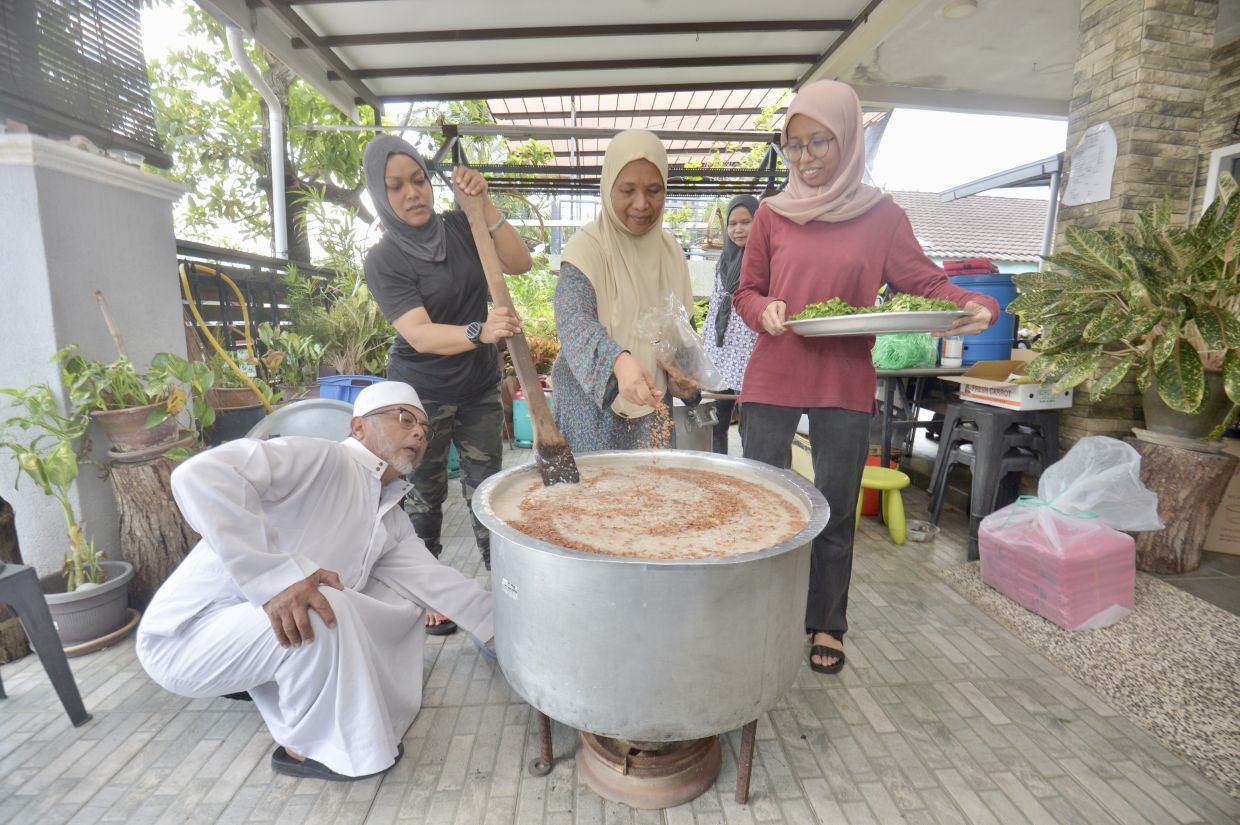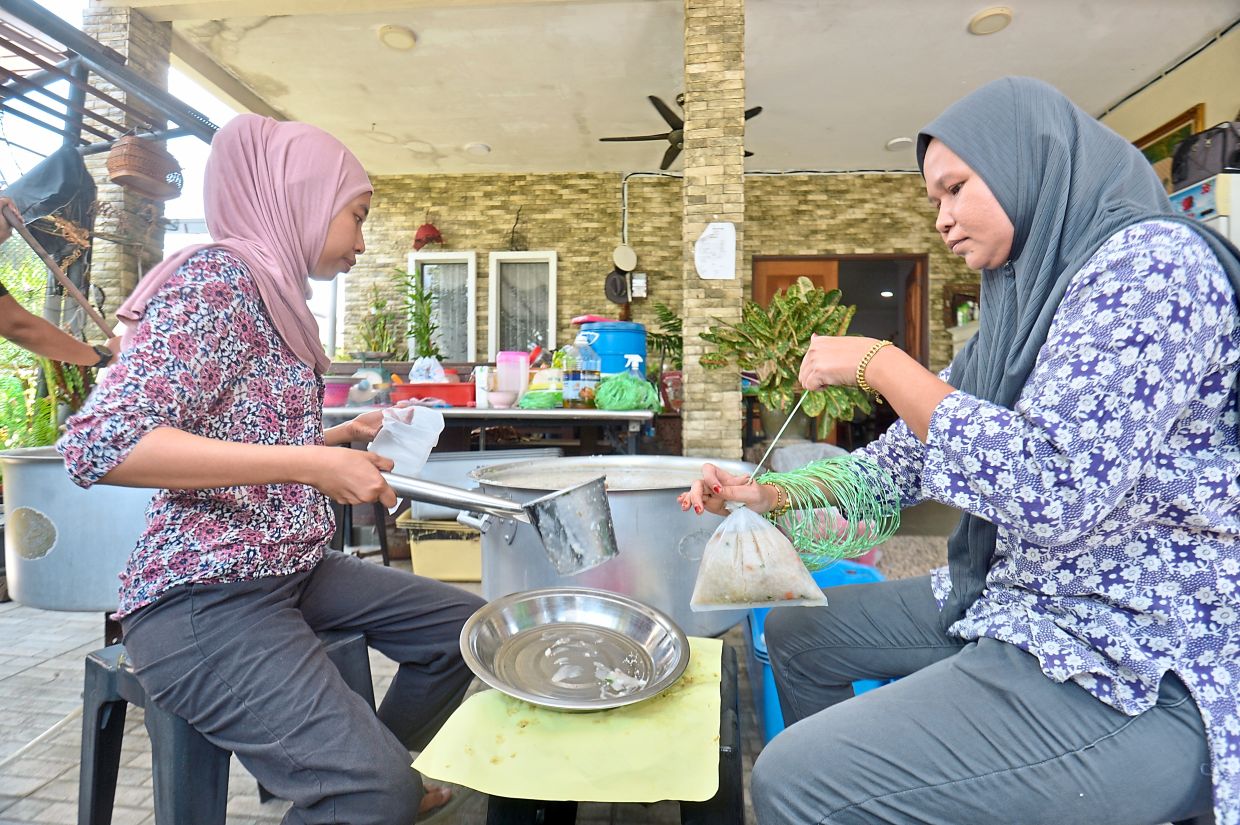For Khadijah (centre), making bubur lambuk is about fostering a sense of community spirit. Photos: The Star/Raja Faisal Hishan
Every Ramadan, Khadijah Muda’s home in Section 3, Petaling Jaya, Selangor is a hive of activity. From slicing the onions and carrots to cooking her special, signature dish in gigantic pots, every afternoon is like a scene from a Malay kenduri, with lots of people completing their specified tasks.
For the past 35 years, Khadijah has cooked bubur lambuk – a savoury rice porridge commonly eaten by Muslims during breaking of fast – daily during the month of Ramadan, which she then distributes to Muslims in her community.
The sexagenarian uses an age-old family recipe that she keeps close to her chest. But cooking this wholesome porridge is more than just a tradition that Khadijah keeps alive. She believes that cooking and distributing the nourishing meal is a powerful way to spread kindness to others during the Muslim holy month.
“Cooking and distributing bubur lambuk is a way to show that we care for each other. It brings Muslims closer and is a nice way to share our rezeki (blessings), especially during the fasting month,” says Khadijah, 66, during an interview in PJ.
For many Muslims, bubur lambuk is synonymous with Ramadan. Mosques typically distribute them in the afternoon for breaking of fast and it is a tradition for Muslims to cook this dish communally and then give it for free, to others.
This gesture is to make sure that everyone, even the poorest in the neighbourhood, will be able to savour a good, hearty meal when they break fast.
Bubur lambuk is typically made of rice, meat (chicken, fish or beef), vegetables like carrots and peas as well as aromatics like ginger, garlic, lemongrass and spring onion. While these basic ingredients are typical, some specific components and cooking methods may differ according to region, cultural influences and family recipes.
In Selangor and Negri Sembilan, for example, bubur lambuk might be spicier and richer in flavour, often incorporating ingredients like coconut milk and chili. In the east coast states of Kelantan and Terengganu, the same porridge may feature more fish and local herbs, reflecting the coastal influence on their cuisine.
The dish is usually cooked by members of the Muslim community who volunteer for the task throughout the month. This communal initiative does not only strengthen ties among them but also promotes values such as generosity, compassion and communal cooperation.
Nourishing goodness
Khadijah was born and raised in Dungun, Terengganu. She grew up eating her mother’s bubur lambuk during Ramadan, cooked with fish and a mixture of vegetables like fiddlehead greens, water spinach and herbs like lemongrass, Thai basil and turmeric leaves.
“Fish bubur lambuk is popular in the East Coast states because we have easy access to seafood. The recipe I use was handed down to me by my mother, who learnt it from her mother.
“This recipe has been in our family for generations and we always prepare it during the fasting month,” explains the mother of three.
But for the PJ community, she prepares a different version with beef, carrot, spinach, blended anchovies, and ground spices like cinnamon, star anise and cardamom.
“I notice that people prefer bubur lambuk with beef, spinach and carrots. They find it to be a lighter and more palatable choice for breaking of fast.
“Making fish bubur lambuk is actually time-consuming. Once cleaned and deboned, the fish needs to be cooked first before adding it to the bubur. This involves boiling the fish until it is fully cooked, followed by the process of separating the flesh from the bones,” said Khadijah, who used to run a food business close to Masjid Jamek Sultan Abdul Aziz (MJSAA), PJ, for close to 30 years.
The mosque is just a stone’s throw away from her home.
Given her experience in the food business, it was only natural that the mosque’s committee entrusted her with the responsibility of overseeing the preparation of bubur lambuk for the community back in the late 1980s.
Her husband Mohd Daud Ibrahim, 64, is the bilal (caller to prayer) of MJSAA.
“When I used to operate my food business, I’d take the whole Ramadan off. So when the mosque committee offered me the chance to make bubur lambuk for the community, I couldn’t say no. It is a privilege to do this,” she says.
“In the initial years, I used to cook several pots of bubur lambuk at the mosque. Back then, my main challenge was cooking in bulk for about 250-300 people. So, I refined the recipe by adjusting ingredients and techniques to prevent uneven cooking and burning. Porridge can burn if it is left unattended on high heat for too long. Stirring regularly and controlling the heat are both important to prevent burning.”
Her youngest daughter, Nur Farhani Mohd Daud, 34, fondly recalls assisting her mother in cooking bubur lambuk at the mosque since she was a young child. She’s been helping her mother for close to three decades.
“I remember how my siblings and I would be tasked with chopping onions, washing bags of rice and helping Ibu stir pots of bubuk lambuk for hours.
“Even though it was tiring, we always enjoyed helping her prepare this special dish. I also remember how I used to play in the kitchen... and Ibu would scold us because we would be running around the pots filled with boiling hot porridge.
“And it was also nice to to see my friends queueing up to collect the porridge at the mosque. Back then, people used to bring their own pots, containers and flasks to pack bubur lambuk,” shares Nur Farhani, a human resource executive.
In the last few years, Khadijah has been preparing bubur lambuk in her home instead of at the mosque because she finds it more comfortable and conducive. She’s equipped her home with extra burners and has bought three large aluminium pots, each able to cook up to 10kgs of rice, to accommodate the large-scale cooking of the porridge.
A family affair
Throughout Ramadan, the community surrounding Section 3 generously donates essentials such as rice, beef, spices and vegetables to Khadijah, to support her in the preparation of bubur lambuk.
“While any type of rice can be used to cook bubur lambuk, I prefer using normal white rice. Some people use broken rice but I don’t feel comfortable as sometimes a bag comes with small stones and husks. The most expensive item, beef, has been sponsored by a supplier, for which I am truly grateful,” she says while dicing carrots and onions for the porridge.
During the fasting month, she gives out up to 450 packets of bubur lambuk a day. A portion of this is given out from her home and some are distributed at MJSAA.
Apart from the packs she prepares for the community, Khadijah also takes orders from hospitals and schools in the neighbourhood who pay her to cook her delicious bubur.
“I have people coming from as far as Kuala Lumpur and Shah Alam to enjoy my bubur. It’s heartwarming to see how a simple bowl of porridge can have such an impact and reach. I find it really meaningful.”
Preparation starts around mid-morning each day, says Khadijah who has enlisted the help of her husband, Nur Farhani as well as her elder daughter Nurul Asyikin Mohd Daud, 36.
On weekends, her nieces, Rubiah Mat Nong, 47, and Ruzanna Abdul Rahman, 40, eagerly lend their hands.
“I start cooking at 11.30am, and it takes about three hours to cook the porridge,” says Khadijah, while stirring in chopped onions, ginger and garlic paste into the pots.
“I’m glad my daughters and nieces are also involved in this. It’s knowledge for them and, hopefully, they can continue the tradition when my husband and I are older,” says the motherly figure.
While waiting for the porridge to cook, Mohd Daud cuts raffia strings to make ties. These ties will be used to secure the packets of bubur lambuk once they are ready for distribution.
The aroma of spices wafts through Khadijah’s porch, as the porridge simmers gently. When it reaches a rolling boil, everyone takes their turn to stir the pot with a large wooden paddle each.
Once the porridge is cooked, everyone gathers around the hot pots and helps scoop the porridge into packets before they are distributed to Muslims living in the vicinity.
Making bubur lambuk during the fasting month is a tiring task, but Khadijah does it passionately and with love.
“It is a privilege to be able to contribute to the well-being of everyone around us, especially during Ramadan. I hope to continue preparing bubur lambuk for many more years to come.”
Food for the soul
For Khadijah (centre), making bubur lambuk is about fostering a sense of community spirit. Photos: The Star/Raja Faisal Hishan
RAJA FAISAL HISHAN/
Mohd Daud cuts raffia strings to make ties which will be used to secure each packet of bubur lambuk once it's ready for distribution.
— RAJA FAISAL HISHAN/The Star
Making bubur lambuk during the fasting month is a tiring task, but Nur Farhani (right) and her family do it with love.
— RAJA FAISAL HISHAN/The Star
Bubur lambuk provides nourishment after a day’s fasting.
— RAJA FAISAL HISHAN/The Star
Bubur lambuk is distributed to those in need or to the community at large.
— RAJA FAISAL HISHAN/The Star
The volunteer team (from left) Nur Farhani, Rubiah and Nurul Asyikin busy prepping the vegetables before the cooking starts. It takes about three hours to cook the delicious porridge.
— RAJA FAISAL HISHAN/The Star
Nur Farhani has been helping her family prepare bubur lambuk for the community since she was a young girl.
— RAJA FAISAL HISHAN/The Star
The rice must be washed several times to remove impurities, ensuring a clean base for bubur lambuk.
— RAJA FAISAL HISHAN/The Star
In the 1980s, Khadijah (left) and Mohd Daud (centre) cooked pots of bubur lambuk daily at Masjid Jamek Sultan Abdul Aziz in Petaling Jaya. Photo: Khadijah Muda
— KHADIJAH MUDA
Starting young: Nur Farhani has been helping her family make bubur lambuk for decades. Photo: Khadijah Muda
Members of the community donate raw ingredients to Khadijah, supporting her in the preparation of bubur lambuk. Photo: The Star/Sheela Chandran
SHEELA CHANDRAN/The Star
Khadijah (centre) feels priviledged to lead the communal cooking of the traditional bubur every Ramadan for the last three decades.
— Photos: RAJA FAISAL HISHAN/The Star

















